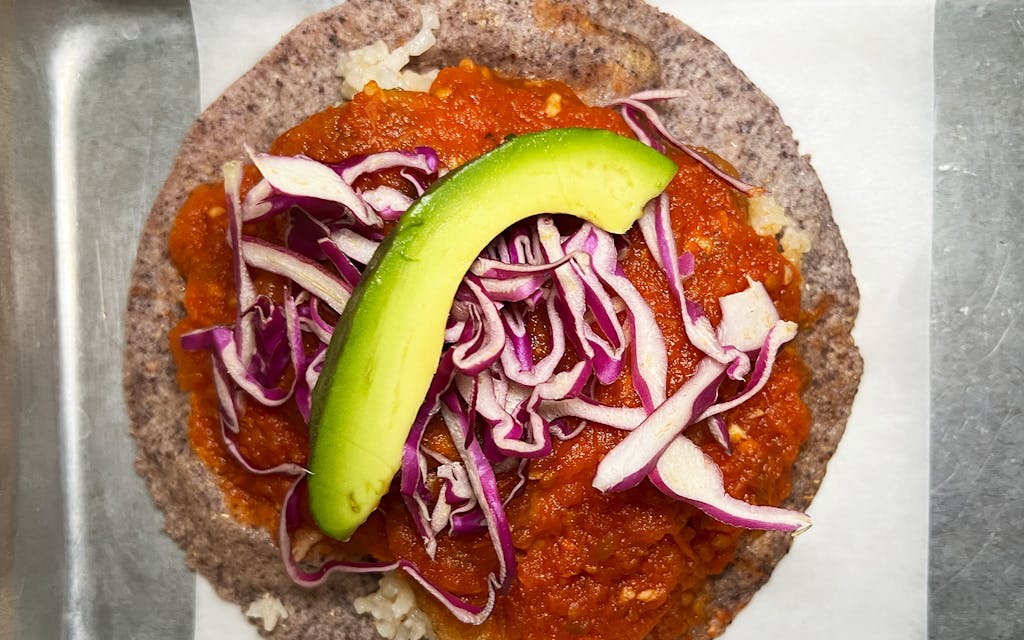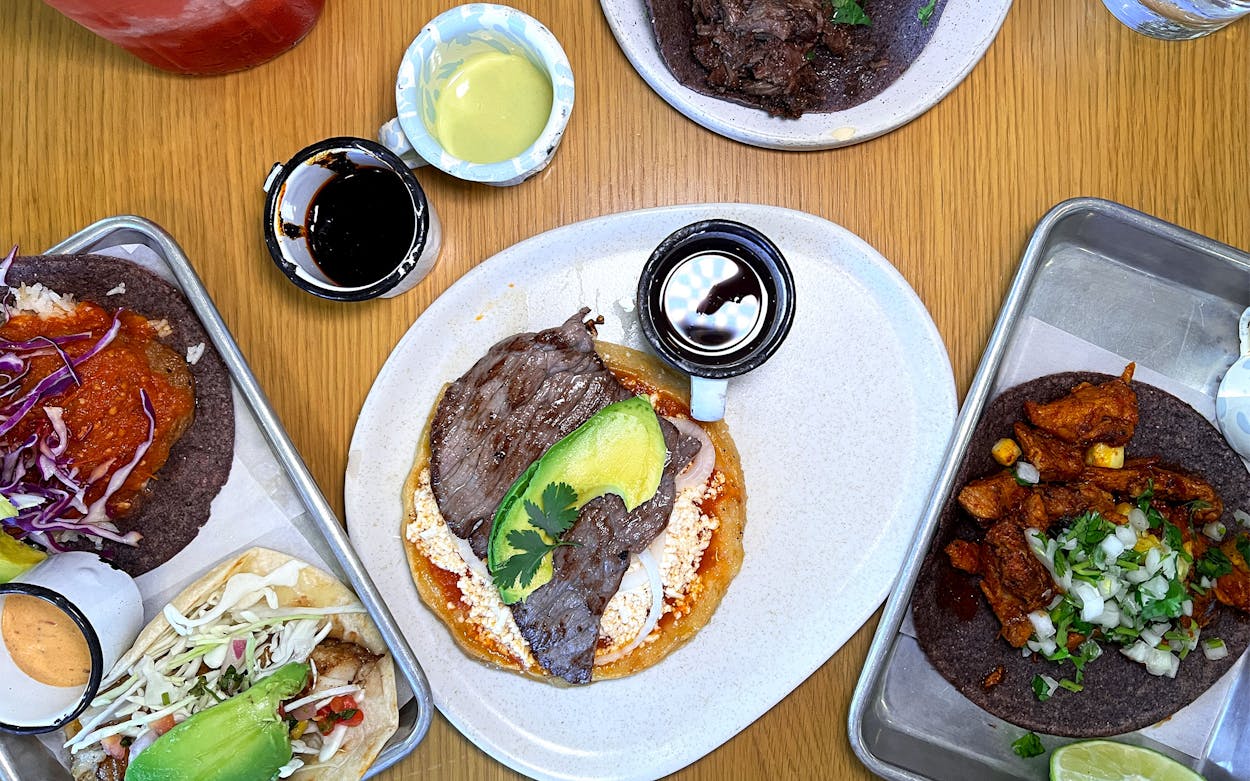Keeping an eye on the developments of Veracruz All Natural is required for Austin taco lovers. Over the last fifteen years, sisters Reyna and Maritza Vazquez have built an empire consisting of trucks, a walk-up stand, a brick-and-mortar location, a hotel restaurant, and a forthcoming spot inside the Travis County Civil and Family Court Facility, in downtown Austin. They also temporarily opened a new concept, Hot Tacos, in Los Angeles. The truck in Southern California operated during the COVID-19 pandemic before the Vazquez sisters announced they were temporarily relocating it to Austin’s Rainey Street.
Nevertheless, Veracruz All Natural’s success is arguably built on its migas taco, which features scrambled eggs mixed with tomatoes, onions, and Monterey Jack cheese, with cilantro and avocado as garnishes. The Vazquezes’ interpretation of the classic Tex-Mex dish is based on a recipe their mother made when the sisters were growing up in their native Veracruz. The migas taco has gone on to define breakfast tacos for folks across the country, with restaurants in other cities, from Brooklyn to Los Angeles, listing the dish prominently on their menus. Most taco joints—including those in Texas—misunderstand the importance of the textural interplay that’s necessary to nail it.
The hype around Veracruz’s migas taco has always been confusing to me. It’s inconsistent at best, with its quality varying from location to location. The counter at the Line hotel in downtown Austin has much better tacos, including the chile relleno, which highlights a hearty, cheese-stuffed, battered-and-fried poblano. Even the chile relleno taco has its own issue, since it’s not available at all outposts. Thankfully, it is a menu staple at nearly five-month-old Veracruz Fonda, in Austin’s Mueller mixed-use development.
The newest venture from the Vazquez sisters is a full-service, breakfast-to-dinner restaurant with a bar. Contemporary design elements—including images of chic, legendary Mexican actress-singer María Félix—fill the fetching interior. Combined with the food, this makes Veracruz Fonda the fully realized vision of the Veracruz brand—and what the Vazquezes should have been doing all along.

Reyna Vazquez calls Fonda their ultimate goal. “The truth is, it’s always been our dream,” she explains. “As Latinas, as Hispanics, as women, it’s a testament to what can be achieved, especially in this country.” The Vazquezes crossed the river with nothing, they say, and they had to work and make things that were difficult for them, that were outside their comfort zones. “All the while, we have fought to manifest this dream,” Reyna adds.
Begin with ordering from the list of rotating aguas frescas. The sandía (watermelon) is potable air-conditioning and has the consistency of a slushy. The ice is made from watermelon juice, which prevents the drink from being watered down. There is little added sugar—if any—in the aguas frescas. It’s all about the natural flavors and sugars of the fruits. Every agua fresca is taste tested by the sisters’ mother, Reyna Gutierrez, referred to as “La Ley” (the Law). La Ley has diabetes, and Reyna and Martiza want their mother’s approval and to give her the opportunity to drink any flavor she wants.
“Almost everything that we do is about remembrances,” Maritza says. “[The food and drinks] transport us to the food that we ate when we were children.” Much of that was in La Ley’s own fonda, a type of Mexican restaurant that features a quick prix fixe meal called comida corrida or comida económica (fast food or affordable food).
When it was open, a meal at La Ley’s fonda in Veracruz consisted of a salad, a soup, a guisado, and an agua fresca of the day. Its flavor depended on what was available fresh at the local market. Veracruz Fonda doesn’t stay true to the fonda concept; rather, its full menu and specials have something for everyone—especially for fans of the Veracruz region’s specialties. Still, Reyna Vazquez says patience is required. “[Comida corrida] is what defines a fonda, and we’ll eventually get to the point where we feel comfortable offering such a menu during certain times,” she says.
One of the restaurant’s signature dishes is the picada, a round masa preparation with crimped edges typical of Veracruz. Its edges aren’t as tall as those of a sope, but a picada is also larger than a sope. You can top it with salsa, and Veracruz Fonda offers a tomatillo salsa, a mole, and a tomato-based salsa ranchera. The last is thin and allows the nixtamalized masa’s flavor to come through. Queso fresco is sprinkled atop the dish, and sliced onions add flair. Eggs or cecina (dried beef) are available as toppings. I like the cecina, but honestly, the picada is so good it doesn’t require additions. It’s one of my favorite plates at the restaurant. Reyna told me she had recently returned from a trip to Xalapa, the capital of the state of Veracruz, where she was exposed to different versions of picadas. “It can be very versatile in terms of toppings and salsa,” she says. “So, I’d love to slowly introduce more versions.”
It’s also refreshing to see the owners move beyond tacos. The “signature plates” include yellow squash sautéed with pico de gallo, smoky chipotle, and corn and finished with queso fresco; whole red snapper; and juicy, tangy cochinita pibil. Blue-corn tortillas are served alongside each of those dishes. “To be able to put these platters, which are really from our hearts—the platters that we were raised on from childhood—is truly, for us, a dream realized,” Reyna says.
For the first meal of the day, it’s all about chilaquiles. There is perhaps no better Mexican breakfast than stale tortillas cut into triangles, covered in salsa, and finished with queso fresco. Whenever I eat them, the chips start out crunchy and slowly soften until I revel in their comfort. The only component that improves chilaquiles is café de olla, a coffee made with cinnamon and piloncillo, a brown cone of unprocessed sugar. Its sweetness-spiked bitterness is the perfect juxtaposition to a preferably spicy pile of chilaquiles. At Veracruz Fonda, chilaquiles are gussied up with crema, cecina, and eggs and come with sides of refried black beans and fried plantains. The extras are great, but just ask for straight-up chilaquiles.
Of course, the tacos at Veracruz Fonda are myriad. They include the aforementioned chile relleno as well as the beloved migas during breakfast. There are also tacos with silky, beefy barbacoa and slightly crunchy milanesa (thin cuts of breaded and fried chicken), and daily specials might include the fiery, cauliflower-based Furioso. Always get the tacos on the nixtamalized blue-corn tortillas, made from masa sourced from Tortilleria Azteca in Pflugerville, and request a side of salsa macha, also originally from Veracruz.
Finish every meal with a fresh concha, which, like the aguas frescas, rotate flavors. I missed out on the popular blue-corn flavor, but I was lucky enough to sink my teeth into the fragrant pecan concha. Based on that one alone, I will always order a concha during each visit to Veracruz Fonda.
The journey to opening the restaurant was one of fits and starts. Reyna and Maritza first saw the corner space five years ago. They loved it and felt it was the proper place for their dream restaurant. “The concept was fully formed in our minds from the start,” Reyna says. Yet they decided to wait. Developers showed them the space twice more before they agreed to build out what would become Veracruz Fonda. “We needed to wait for the right time,” Reyna said. I’m glad they eventually moved in and opened Veracruz Fonda—Austin should be too.
Veracruz Fonda
1905 Aldrich, Suite 125, Austin
Phone: 737-318-4896
Hours: Sunday–Thursday 8–10, Friday–Saturday 8–11
- More About:
- Tacos
- Restaurant Reviews
- Austin








